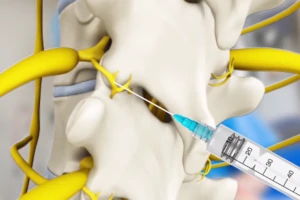Nerve Block Injections
Nerve block injections are a widely used and effective method chosen by many of our patients to alleviate both chronic and acute nerve pain. We invite you to schedule a consultation to determine if this treatment is suitable for your needs.
Nerve blocks are a pivotal component in the field of pain management, offering targeted relief for patients suffering from acute and chronic pain conditions. These procedures involve the injection of anesthetics, steroids, or other medications directly around or into a nerve or group of nerves that are contributing to the patient's pain. By blocking the transmission of pain signals to the brain, nerve blocks can provide temporary or prolonged relief from pain, depending on the type of block administered. Commonly used to treat conditions such as neuropathic pain, complex regional pain syndrome (CRPS), and specific types of headaches, nerve blocks can also be utilized for diagnostic purposes, helping to identify the specific nerves involved in pain generation.
The application of nerve blocks in pain management not only facilitates significant pain relief but also enables patients to engage more effectively in physical therapy and rehabilitation by reducing pain barriers. This can lead to improved mobility, function, and overall quality of life. Additionally, nerve blocks can reduce the reliance on oral pain medications, minimizing the potential for side effects and dependency issues associated with long-term use of such drugs. However, like any medical procedure, nerve blocks carry certain risks, including infection, bleeding, and nerve damage, although these are rare. The decision to proceed with a nerve block should be made in consultation with a pain management specialist, who can assess the potential benefits and risks based on the individual's specific condition and health profile.
Our team has extensive expertise in performing various nerve blocks, achieving significant and enduring improvements in pain management for our patients. We encourage you to schedule a consultation to explore whether a nerve block could be the optimal treatment solution for your pain relief needs. On this page you will find some of the common nerve blocks that we perform in our clinics.
Sympathetic Nerve Block
A sympathetic nerve block is a medical procedure used to diagnose and alleviate pain caused by the sympathetic nervous system, which controls involuntary bodily functions. By injecting a local anesthetic near the sympathetic nerve tissue linked to pain, the procedure aims to block pain signals, offering relief from conditions such as complex regional pain syndrome (CRPS), peripheral neuropathy, and chronic abdominal pain. This block not only helps in managing pain but also aids in diagnosing the pain's source by assessing the body's response to the anesthetic, with targeted applications including the stellate ganglion for upper body pain, the lumbar sympathetic chain for lower body pain, and the celiac plexus for abdominal pain.
Learn MoreMedial Branch Nerve Block
A medial branch block is a diagnostic and therapeutic procedure used in pain management to target the medial branch nerves, which are responsible for transmitting pain signals from the facet joints in the spine to the brain. These small nerves feed out from the facet joints of the spine, which can become painful due to arthritis, injury, or degeneration. During the procedure, a local anesthetic, and sometimes a steroid, is injected near the medial branch nerves that innervate the suspected painful facet joints. If the patient experiences significant pain relief shortly after the injection, it can confirm that the facet joint(s) served by those nerves is the source of pain. This temporary relief also helps in planning further treatment, which may include radiofrequency ablation for longer-term pain relief. Medial branch blocks are commonly used for diagnosing and managing neck, mid-back, and lower back pain.
Learn MoreGenicular Nerve Block
A genicular nerve block, also known as a genicular nerve branch block, is a targeted pain management procedure used to diagnose and treat chronic knee pain, particularly in individuals who may not be candidates for knee replacement surgery or those still experiencing pain post-surgery. This technique involves the injection of a local anesthetic, with or without a steroid, around the genicular nerves responsible for transmitting pain signals from the knee. By temporarily numbing these nerves, the procedure can significantly reduce knee pain and improve function. The success of a genicular nerve block in providing relief can also help determine if the patient is a good candidate for a more permanent pain relief procedure, such as genicular nerve radiofrequency ablation. This approach is especially beneficial for patients with osteoarthritis, degenerative joint disease, or residual pain after knee surgery, offering a minimally invasive option for pain relief and enhanced mobility.
Learn MoreStellate Ganglion Block
A stellate ganglion block is a specialized procedure used in pain management to alleviate chronic pain conditions that affect the face, head, neck, and upper extremities. This block targets the stellate ganglion, a collection of sympathetic nerve fibers located in the neck, near the base of the cervical spine. By injecting a local anesthetic into this area, the procedure disrupts pain signals transmitted by these nerves, providing relief from conditions such as complex regional pain syndrome (CRPS), phantom limb pain, and certain types of headaches or facial pain. In addition to pain relief, a stellate ganglion block can also improve circulation and reduce sweating in the affected area. The efficacy of this block not only offers immediate pain relief but can also serve as a diagnostic tool to confirm the source of pain, guiding further treatment decisions.
Learn More


